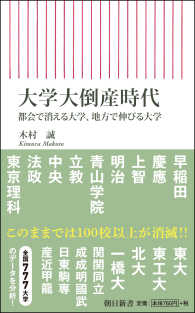- ホーム
- > 洋書
- > ドイツ書
- > Humanities, Arts & Music
- > Philosophy
- > antiquity
Description
(Text)
Die Synthese aus antiker Philosophie und Christentum - 'Athen' und 'Jerusalem' - gilt seit jeher als eine identitätstiftende Besonderheit der abendländischen Kultur. Dieser Vorstellung stehen jedoch die Konfrontationen zwischen Philosophie und Christentum in der Spätantike (Kelsos, Porphyrios und Julian Apostata) und in der Neuzeit, insbesondere in der Aufklärung, entgegen. Ihre vergleichende Analyse macht die Zäsuren sichtbar, die das Christentum in der Geschichte der Welt- und Menschenbilder gesetzt hat. Gerade in grundlegenden Fragen der Ethik, Anthropologie und Metaphysik erweist sich jene Vorstellung einer 'abendländischen Synthese' als unzutreffend.
(Review)
»This is a highly sophisticated and thoroughly documented historical study that is also an exciting and enjoyable read. We should cherish books like this, because they sure don't make a lot of them anymore.« Geert Lernout, Bryn Mawr Classical Review »[...] this is an extremely carefully written analysis of ancient texts and their reception patterns, which every theologian and historian of religion must take seriously.« Ulrich L. Lehner, Theological Studies
(Text)
The synthesis of classical philosophy and Christianity, Athens and Jerusalem, has always been seen as a special characteristic which defines the identity of Western culture. However the confrontations between philosophy and Christianity in late antiquity (Celsus, Porphyry and Julian the Apostate) and in the modern era, in particular during the Enlightenment, conflicted with this idea. A comparative analysis of these shows the turning points brought about by Christianity in the history of philosophy and concepts of man. It is especially in fundamental questions of ethics, anthropology and metaphysics that the concept of an »occidental synthesis» is shown to be incorrect.
(Review)
»This is a highly sophisticated and thoroughly documented historical study that is also an exciting and enjoyable read. We should cherish books like this, because they sure don't make a lot of them anymore.« Geert Lernout, Bryn Mawr Classical Review »[...] this is an extremely carefully written analysis of ancient texts and their reception patterns, which every theologian and historian of religion must take seriously.« Ulrich L. Lehner, Theological Studies








